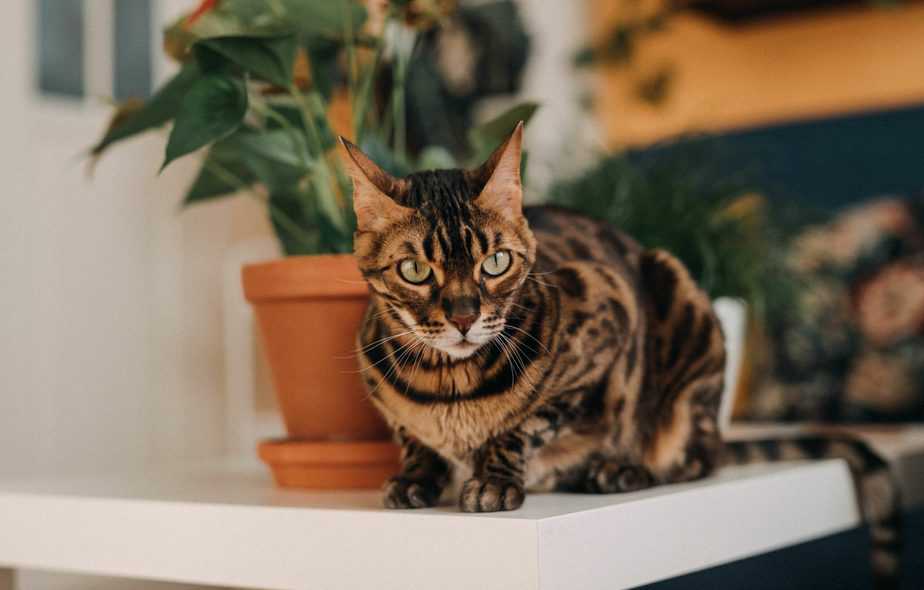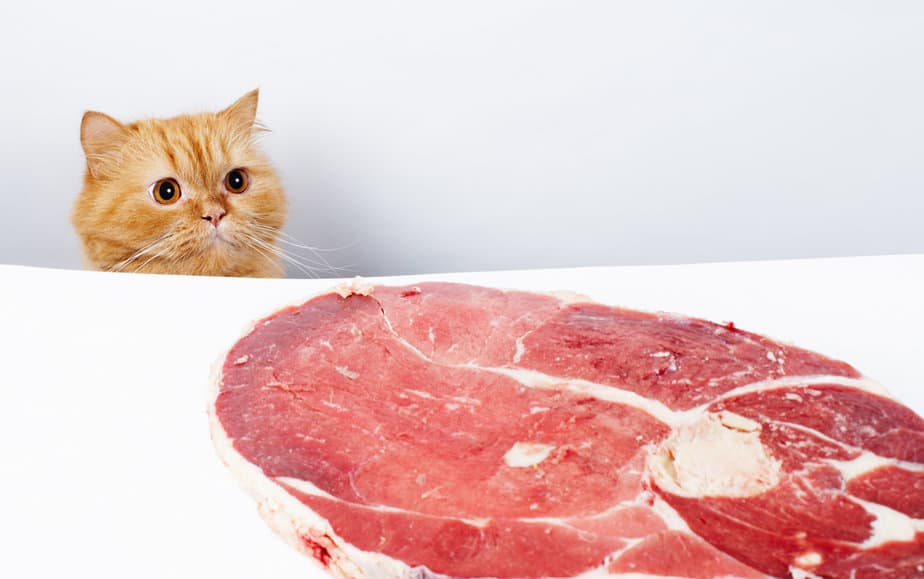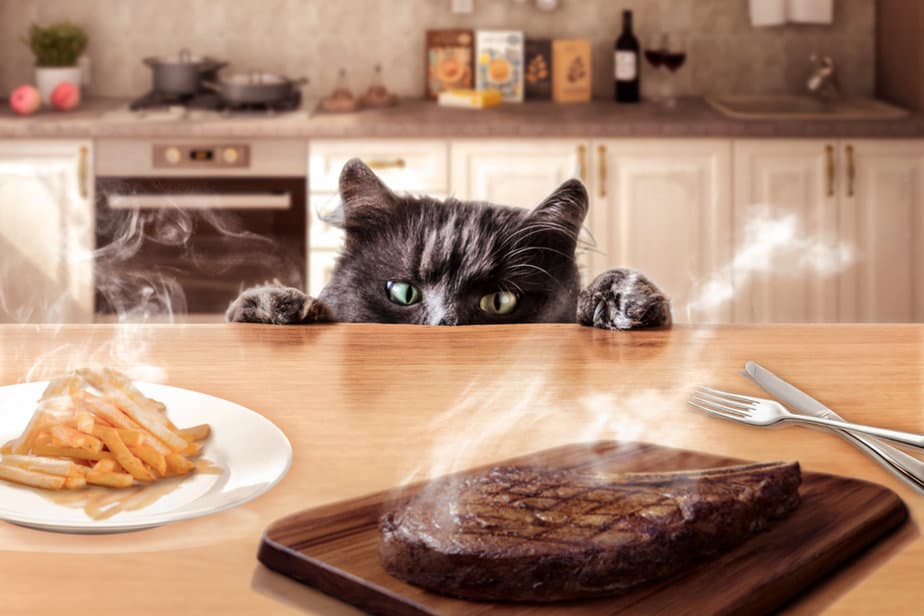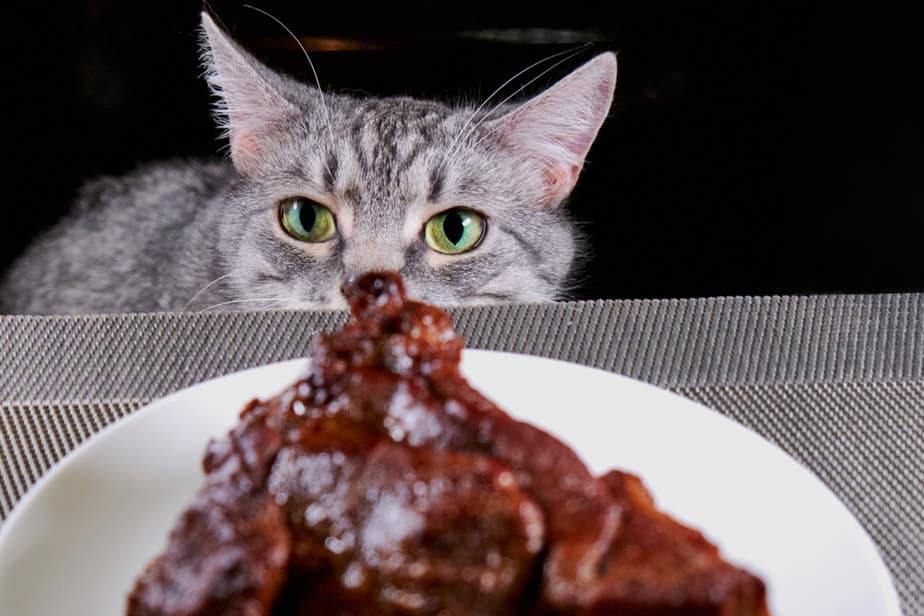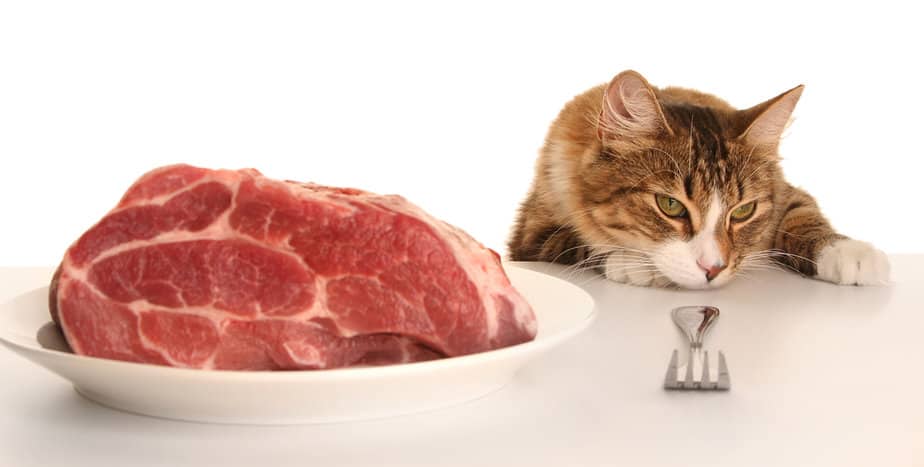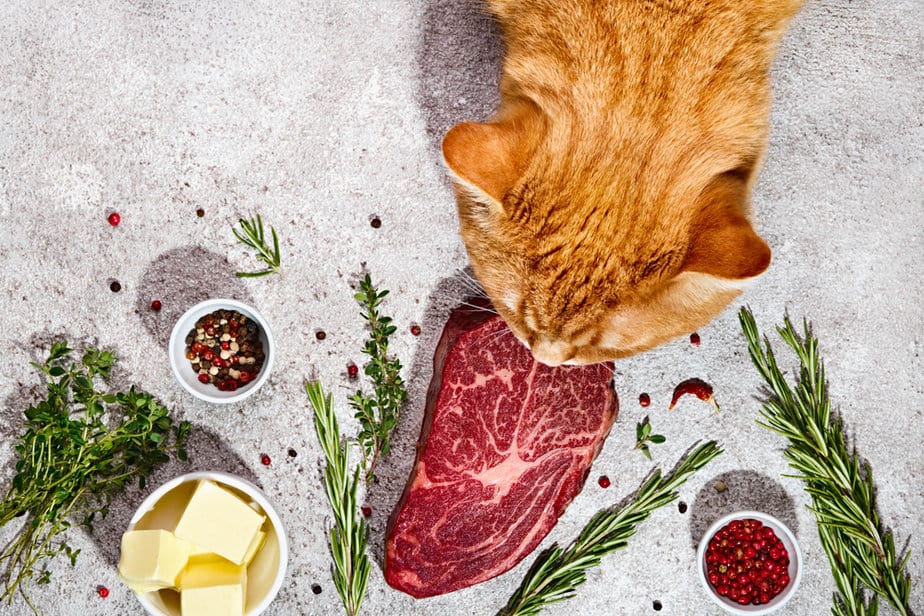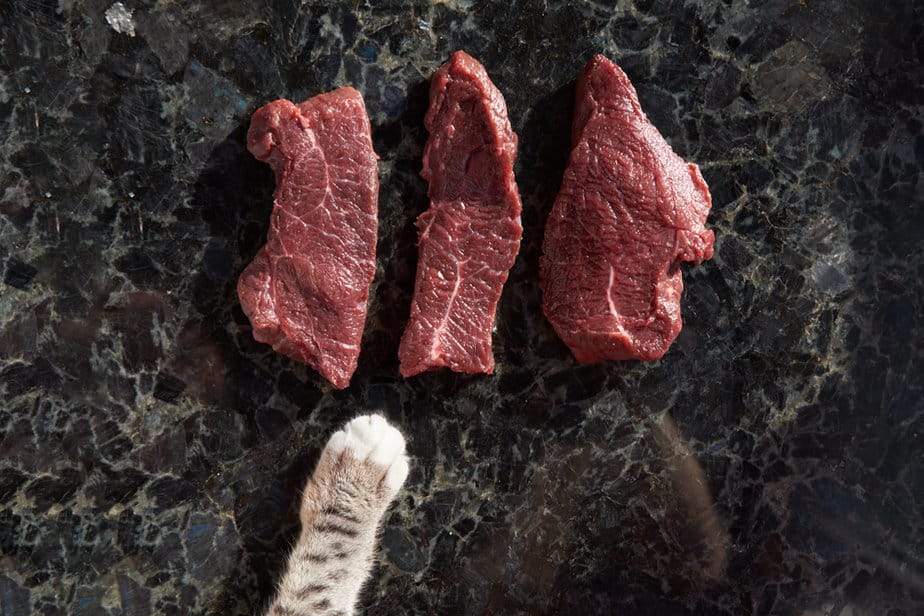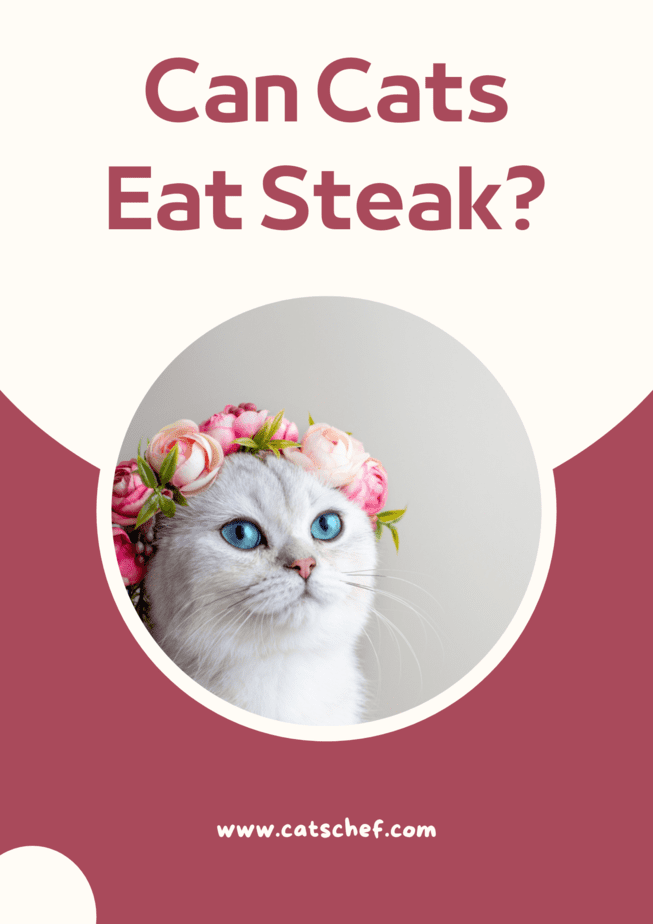📖 Table of Content:
“Dear vet, can you convince my parents to feed me their paw-licking steak next Sunday? That sorry excuse for cat kibble is soooooo boring. I think it will serve me well in my current condition. Thank you.” The question is – can cats eat steak?
Being a cat owner, chances are you’re always on the edge, knowing your furry friend might jump out of nowhere and snatch your food right out of your hands. You can never be too careful with human food, but how can you prevent that from happening?
Her curious little eyes are everywhere! They’re following your every step, waiting for you to let your guard down for a second. The moment she catches you slipping, she’s ready to attack your freshly cooked steak and shamelessly purr her way out of trouble.
So, there’s nothing left for you to do but to hop online, google “can cats eat steak,” and hope for a positive answer. Wonder no more, because you might be onto something.
According to our friends over at the ASPCA (American Society for the Prevention of Cruelty to Animals), steak does not fall under the category of potentially harmful foods for felines.
Not only that, but red meat happens to be one of the safest meats out there. Red meat doesn’t contain any dangerous components, heavy metals, or other contaminants. And, it’s pretty gentle on your feline friend’s sensitive digestive tract.
But… There’s always a but when it comes to feeding your cat anything that isn’t a part of her regular diet. There are a couple of things you need to take into consideration before sharing that delicious Sunday feast with your favorite four-legged friend.
So, can cats eat steak?
Argh, it seems as if we’re always talking about how “cats can eat _____, but only as an occasional treat.” Unfortunately, that seems to be the case with most foods that weren’t supposed to find their way into your cat’s tummy in the first place.
Let’s put it this way, a couple of bites of plain steak shouldn’t cause any health problems to your cat, but that doesn’t mean that you should include them in her regular diet.
Cat food is always a better option as it’s specifically formulated to fit your cat’s nutritional needs. The best way to avoid nutritional imbalances in your cat’s diet is by following the 90% cat food to 10% cat treats rule.
Now that we have that disclaimer out of the way, steak certainly isn’t the worst thing your furry friend can munch on. Let’s not forget that cats are obligate carnivores. They require predominantly animal protein and animal-sourced nutrients in order to survive.
Unlike humans, cats are biologically predisposed to thrive on red meat. Their digestive system is designed to break down, process, and absorb all the incredible nutrients contained within high-quality, fresh meat. So, no reason to worry about the meat aspect!
Cats can eat steak! You just have to make sure to provide your four-legged friend with plenty of vitamins, minerals, and other nutrients contained within pet food, before you surprise her with a couple of tasty steak treats.
What are the benefits of feeding steak to your cat?
Right off the bat, we answered the question of whether cats can eat steak. But, there are still a couple of things to consider before you decide to assume the role of your cat’s personal chef. Are there any benefits to feeding your kitto steak, for instance?
A steak, which is basically a high-quality part of beef, is rich in protein, vitamins, minerals, and other nutrients. Not only can your furry friend benefit from animal protein, but these animal-sourced vitamins and minerals can boost her immunity and improve overall health.
1. Protein
Protein is your feline friend’s most important source of energy. As mentioned before, cats require heaps of meat, animal protein, and animal-sourced nutrients in order to survive. Their overall health depends on the amount of high-quality, fresh meat they consume.
While most commercially available cat foods are packed with protein, it doesn’t hurt to throw an occasional bite of rump or fillet into the mix. With around 25 grams of protein per serving size, this mouthwatering star of the plate is probably a staple in your household.
You might be wondering, what makes protein so beneficial to your cat’s health? Well, foods that are high in protein can help your furry friend maintain a healthy weight, reduce the risk of diabetes and obesity, and fight against numerous other health issues.
Weight loss might not be on your cat’s to-do list, but it’s incredibly important for her to thrive on a healthy diet that ensures her overall health and well-being. Fruits and veggies aren’t really her thing, but she can make good use of a delicious sliver of steak.
2. Vitamins and minerals
Steak is also packed with vitamins, minerals, amino acids, and fatty acids. If you’re still wondering whether cats can eat steak, you might want to look into these nutritional benefits. Trust me, your cat needs that meaty morsel!
Vitamins are essential in your furry friend’s diet. For example, vitamin B6 is responsible for the production of your cat’s red blood cells, which in turn protects her against anemia. It’s also responsible for giving her immune system a necessary boost.
Then, riboflavin helps your cat’s coat health and quality, and niacin gives her the energy to run around your kitchen and crash everything she can get her paws on.
You can’t argue that these two vitamins alone make for great reasons to include steak on your cat’s menu. And on the off chance these vitamins aren’t enough, steak is also rich in minerals like iron, zinc, and selenium.
It goes without saying that minerals play an incredibly important role in the feline body. An occasional bite of steak can bring numerous health benefits to your feline friend, including keeping her bones, muscles, heart, and brain working properly.
3. Vitamin B12
Believe it or not, this vitamin deserves a special rank on the list of benefits of feeding steak to your cat. Vitamin B12, also known as cobalamin, is an essential vitamin responsible for keeping your cat’s nervous system, immune system, and digestive system in check.
While your four-legged friend might be able to produce most essential vitamins on her own, this isn’t the case with vitamin B12. So, it’s incredibly important to provide her with foods that are rich in this vitamin, steak being one of them.
Unfortunately, most adult cats struggle with absorbing enough vitamin B12 because their intestines, liver, and pancreas don’t function the way they should. And, as if that isn’t enough of a hassle, this vitamin disappears out of their system fairly easily.
Some of the signs of vitamin B12 deficiency are weight loss, loss of appetite, lethargy, weakness, diarrhea, and vomiting. If you notice any of these symptoms, contact your vet immediately.
To prevent this from happening, make sure your cat’s diet includes plenty of foods that are packed with vitamins, minerals, and other essential nutrients. Steak contains quite a fair amount of B12, making it a great treat for your furchild.
What are the drawbacks of feeding steak to your cat?
It’s quite clear that we can answer your “can cats eat steak” question with a YES, but that doesn’t mean this delicious delicacy should find its way on your cat’s daily menu. Unfortunately, there are some drawbacks that come with feeding steak to your cat.
Steak fat and bones don’t belong in your cat’s tummy! So, if you’re planning on feeding your furry friend this tasty treat, make sure to remove any fat trimmings and bones beforehand. Trust me, they can wreak havoc in your cat’s body.
1. Fat
Let’s be honest, you wouldn’t mind if your furball gained a little weight because it would make her even more fluffy and adorable. While that sounds incredibly endearing, you shouldn’t feed your cat anything with a high fat content.
Too much fat might leave your cat with much bigger issues than a couple of extra pounds around her waist. Feline obesity is a catalyst for an array of gastrointestinal diseases, including diabetes, heart disease, and pancreatitis.
But, how can you know if you’re feeding your cat too much fat? Well, you will notice signs of intestinal upset including tummy pain, weakness, lethargy, diarrhea, and vomiting. If you notice any of these signs, schedule an appointment with your vet.
It’s always a good idea to consult with your vet before introducing significant changes in your cat’s diet. And, if your furry friend is a big fan of steak, you can always make sure to remove the excess fat beforehand. Believe me, she won’t be any less impressed!
2. Bones
Cats can eat steak, but they certainly can’t eat steak bones. You might think it’s completely fine for your furry friend to nibble on a steak bone because her wild counterparts don’t seem to have an issue with that. But trust me when I say you don’t want your adorable housecat to get seriously hurt!
Bones are notorious for being prone to splintering. Rogue pieces of steak bone could easily get stuck in her throat, cause a blockage, and even lead to a medical emergency. The sharp edges could irritate your cat’s digestive tract, which can in turn lead to vomiting and diarrhea.
If you’re tempted to surprise your cat with a steak bone, consider investing in a chew toy. It’s much better for your cat’s teeth and gums. And, there’s no risk of a high-quality chew toy damaging your feline friend’s internal organs.
3. Seasonings
Yes, you read that right! While you can’t imagine your steak without generous dollops of butter, black pepper, garlic, and rosemary, your furry friend couldn’t agree less. When we say that cats can eat steak, we aren’t referring to the seasoned variety.
Most seasonings aren’t suitable for your cat because they can cause a myriad of digestive issues, including upset stomach, diarrhea, and vomiting. Unfortunately, they can even lead to other serious diseases.
Excessive amounts of salt can leave your furry friend with a condition known as sodium poisoning. Symptoms of sodium poisoning include excessive thirst and urination, weakness, lethargy, diarrhea, and vomiting. In severe cases of sodium toxicity, you’re looking at seizures, tremors, and even coma and death.
She would have to go ham on your Sunday steak dinner to experience any of these symptoms, but it’s better to be safe than sorry when it comes to your favorite four-legged friend’s health.
Onion and garlic, on the other hand, shouldn’t even get an invite to the plate! Unfortunately, all members of the Allium plant family are incredibly toxic to felines and shouldn’t be consumed under any circumstances.
But, don’t let this stop you from surprising your cat with an occasional steak bite! You can always prepare a piece separately, avoiding any harmful seasonings, and make your fluffball incredibly happy.
Can cats eat raw steak?
Oh, the never-ending debate among the pet owners! Can cats thrive on a raw diet? Can raw meat lead to serious health problems? And can cats survive on a raw meat-only diet?
Well, here’s the inside scoop. A lot of pet owners think that it’s completely safe for their cat to consume heaps of raw meat because that’s what she would be doing if she was in the wild. Let’s be honest, you won’t see a wild cat rushing to cook her fresh prey.
While that example makes for a great point, you have to remember that your precious purrincess doesn’t even come close to being that wild. Domesticated cats get their food served on a silver platter, chilled and garnished according to their own wishes and desires.
Jokes aside, there are certain things to consider before feeding your cat raw steak. First things first, raw foods typically contain parasites and bacteria (salmonella and E. coli, to name a few) that could cause serious harm to your cat.
While they typically don’t stick in your cat’s digestive system long enough to cause an infection, it’s better to stay on the safe side. High fever, weakness, lethargy, vomiting, and diarrhea are some of the most common signs you might notice if your cat eats raw meat.
Consult with your vet and check if your furry friend can thrive on a regulated raw diet (or if she can have a couple of bites of raw steak). Other than that, you can always count on the plain, cooked steak for an occasional tasty treat.
Can cats eat steak? Conclusion!
Cats can eat steak, but you should limit them to only a couple of pieces every now and then. While steak does contain a fair amount of vitamins, minerals, and other nutrients, it shouldn’t become a meal substitute.
Make sure to remove the fat and bones as they might lead to various digestive (and other) complications. Additionally, make sure to prepare the steak plainly and properly cooked to avoid any adverse reactions.
This might sound like a lot of effort, but… Your four-legged friend deserves a tasty treat every now and then, especially if she’s a huge fan of your Sunday dinner. Trust me, when you hear her melodic meows and excited taps on the kitchen floor… You’ll forget about everything else!
